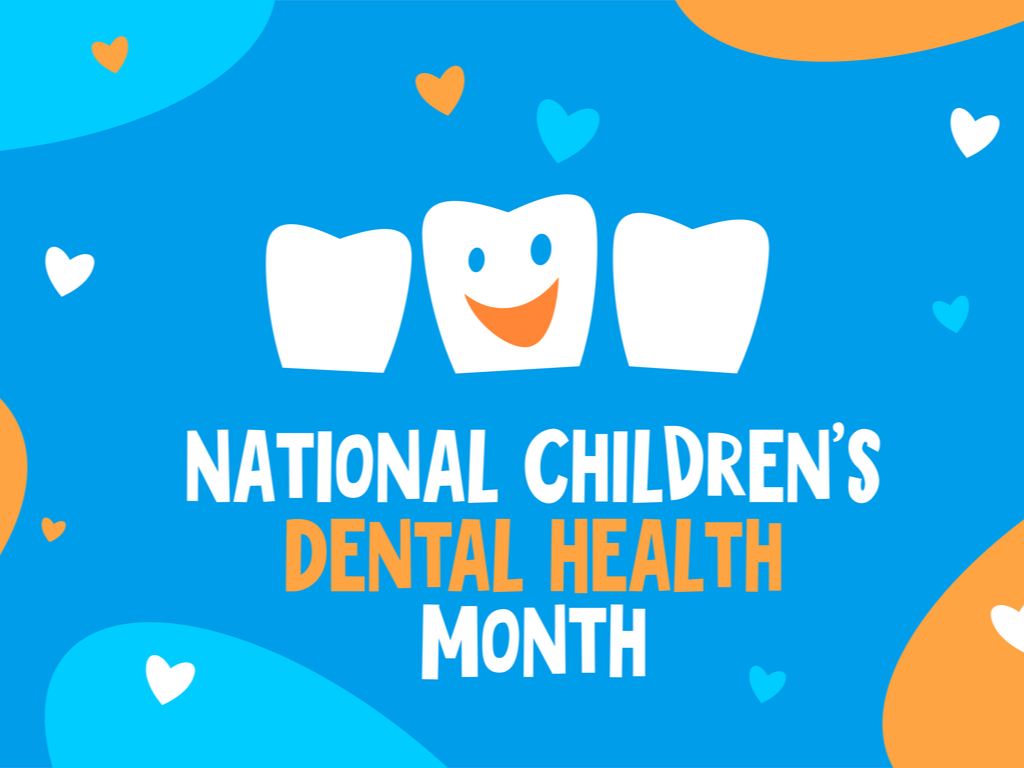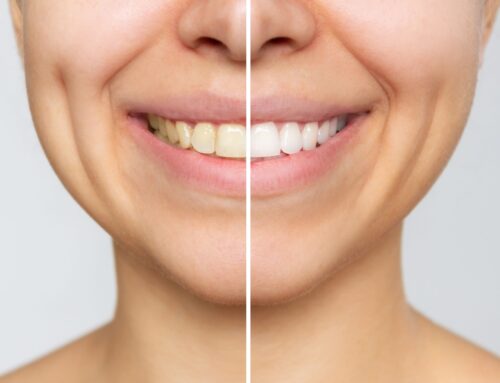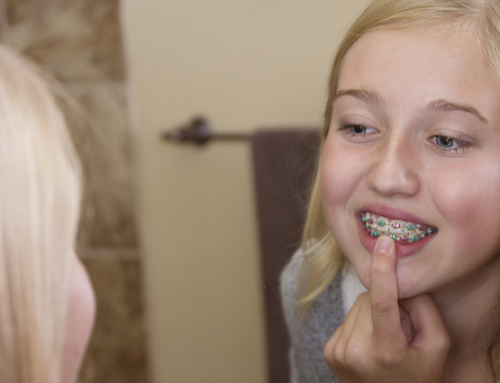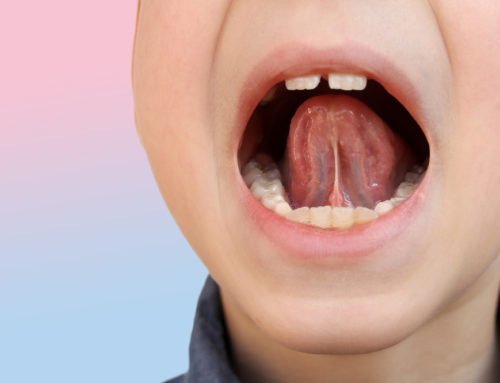National Children’s Dental Health Month
February is National Children’s Dental Health Month, a month-long event started by the
American Dental Association (ADA) to promote good oral health practices for children and raise awareness about the importance of maintaining good dental hygiene from childhood to adulthood.
The ADA has over 159-thousand members with a mission to help dentists succeed by providing evidence-based insights to provide quality oral care for all patients. Additionally, the ADA advocates for public health by focusing on crucial issues such as access to care, rules and regulations surrounding dentistry, and much more.
One way the ADA does this is through National Children’s Dental Health Month, a time when dental professionals, healthcare providers, and educators promote pediatric oral health through various activities and educational programs. These may include free dental screenings, exams, classroom presentations and activities, community events, and educational blogs like this one!
National Children’s Dental Health Month is an important observance because it helps to promote good oral health habits early in life, which can lead to a lifetime of healthy teeth and gums and better overall health.
The theme for National Children’s Dental Health Month changes each year. This year it is “Brush, Floss, Smile.” To help educate the public on the importance of this topic, we thought we would offer some insight into why children’s dental health is important and pass along some of our best “brush, floss, smile” tips.
BRUSH, FLOSS, SMILE
This year’s theme is near and dear to us here at Snodgrass-King, as we know firsthand the importance of teaching children to brush and floss at an early age.
Here are some “Brush, Floss, Smile” tips to help keep your little ones healthy and smiling for life!
See a pediatric dentist at least twice a year:
Because baby teeth fall out, many underestimate the importance of a child seeing a dentist. Even though your child’s baby teeth aren’t there forever, it is still vital for them to see a pediatric dentist to establish good oral health habits early on and to prevent potential dental problems.
Cavities and tooth decay are among the most common health issues affecting children in the U.S. In some cases, they can have a lasting impact on your child and not in a good way. Seeing a pediatric dentist from the first tooth can help with early detection of dental problems. If baby teeth are lost too early due to tooth decay or injury, it can cause problems with the alignment and spacing of adult teeth. A pediatric dentist can identify potential issues early on and provide appropriate treatment.
A pediatric dentist can also monitor the growth and development of a baby’s teeth and jaws to ensure they are developing properly. This can help to identify potential orthodontic issues early on and provide appropriate treatment.
Additionally, taking your child to the dentist early allows them to get comfortable with the dentist and ensure they know from an early age why it’s important to go to the dentist so their teeth can be healthy and clean!
Your child should visit a dentist’s office as soon as 1 year old or when their first tooth appears. Ideally, you should take your child to a pediatric dentist, as they not only have the special tools and skills needed to treat little ones, the office environment at a pediatric dentist is typically much more kid-friendly. For example, at Snodgrass-King, we offer a relaxing and fun environment with TVs in each dental room and kid play areas.
Brush 2x a day:
Don’t let your kids slack on brushing their teeth. It can be easy to skip brushing, especially late at night, but make sure you enforce the rules to ensure your child brushes twice a day. The more regularly your kids brush their teeth, the more dental issues you will prevent.
Sticking to a schedule and making it a habit to brush at least twice a day for two minutes is important. To help with this, make brushing fun! If your child has a favorite song, let them brush their teeth while it is playing. You can also read a book to your child while brushing their teeth. Even better, brush your teeth at the same time! Monkey see, monkey do! Watching you brush and floss your teeth is the best way for them to learn.
Also, don’t forget your child’s tongue. Plaque left on your tongue can lead to bad breath. Teach your child how to brush their tongue as well as their teeth!
You should help your child when brushing and flossing their teeth until they are around seven years old. After that, it’s advised that you allow them to brush and floss on their own. Once they are done, ask them to open up and inspect that they got the job done!
Another important brushing tip is to replace your child’s toothbrush every 3 months.
Use fluoride:
Fluoride helps fight against your child’s teeth being damaged by any candies or sugary foods that they may eat. It can be found in toothpaste form and in liquid form. Fluoride has been proven to reverse early signs of tooth decay, which is often seen in children that drink a lot of juices and drink from a bottle for too long.
Fluoride toothpaste is safe and the best toothpaste to prevent cavities. It also helps protect your teeth by making them stronger and building them up to resist the acid found in some food and drinks.
Fluoride water is a great alternative or complement to toothpaste. It is also calorie-free. Most kids love this choice of beverage because it reminds them of a sports drink or juice. Parents shouldn’t worry about their children drinking fluoridated water. It’s an easy way to ensure your children’s teeth are protected while allowing them to drink a sweet drink every once in a while.
Floss daily:
Flossing can be tiring and hard for small children, but as a parent, it is vital you make sure your child is flossing. Flossing is essential to keeping teeth strong and helping achieve optimal oral health. Make sure to treat flossing as equally as important as brushing your child’s teeth. Even if it’s challenging, you must ensure your child continues flossing.
Nine times out of ten, young children don’t want to floss or stop flossing for the same reason as many adults– it hurts, their gums bleed, or it isn’t easy. This is normal at times, but if your child continues to complain of pain or their gums excessively bleed, there could be a bigger problem. Make sure to let the pediatric dentist your child sees know if your child has had prolonged issues while flossing, as this might be a sign of gum disease.
Offer rewards:
A healthy rewards system and incentives can help motivate your child to brush and floss daily. Let them pick out their own toothbrush and the song they brush to, and have a fun method for tracking their brushing and flossing progress. You could even offer a toy they’ve been asking for or take them somewhere special after several months of “perfect” brushing and flossing.
Most pediatric dentist offices have a similar rewards system. Whenever your child goes to the pediatric dentist to get their teeth cleaned, the dentist typically has a toy box from which the kids can pick a toy at the end of their appointment.
Eat healthy foods and limit sugary beverages:
If you allow your child to eat sweets, it is best to do so right after a meal instead of eating them as a solo snack. Having sweets after a main meal is better for their teeth because the food serves as a coat or protective layer.
Snacking is a typical daily occurrence for kids, but sweets shouldn’t always be associated with snack time. When offering your child snacks, give them veggies or something healthier, such as fruit, to make it a healthy snacking habit.
Crunchy fruits and vegetables offer additional benefits because they can help keep teeth strong. Drinking tap water helps with the strength of the teeth.
DANGERS OF BAD DENTAL HEALTH IN PEDIATRICS
Even though baby teeth eventually fall out, it is still important for infants to see a pediatric dentist to establish good oral health habits early on, prevent potential dental problems, and monitor the growth and development of their teeth and jaws.
Practicing good dental health means keeping your mouth, teeth, and gums healthy. It also helps your overall appearance and quality of life. Oral health is essential, and teaching your children this is important.
Bad dental health in pediatrics can lead to several health risks, including physical, emotional, and social issues. Here are some of the dangers of bad dental health in pediatrics:
Tooth Decay and Gum Disease:
Poor dental hygiene in children can lead to tooth decay and gum disease, which can cause pain, discomfort, and even tooth loss.
Difficulty Eating and Speaking:
Tooth decay and gum disease can make it difficult for children to eat and speak, causing them to miss out on essential nutrients and social interactions. Children may also experience embarrassment or self-consciousness about their appearance or bad breath, which can negatively impact their social development.
Poor Academic Performance:
Chronic dental pain and discomfort can cause distraction and difficulty concentrating in class, leading to poor academic performance. Children who experience dental problems may also miss school days, which can cause them to fall behind in their studies.
Developmental Delays:
In severe cases, bad dental health in pediatrics can cause developmental delays, such as speech problems and delayed physical growth. Children may also experience developmental delays in social skills, such as interacting with peers or participating in extracurricular activities.
Increased Risk of Chronic Diseases:
Bad dental health in pediatrics can also increase the risk of chronic diseases, such as heart disease, diabetes, and respiratory infections. The bacteria from gum disease can enter the bloodstream and cause inflammation throughout the body, which can contribute to the development of chronic diseases.
To prevent these dangers, developing good dental hygiene habits in children from a young age is essential. Parents should encourage their children to brush their teeth twice daily, floss regularly, and visit the pediatric dentist for regular check-ups and cleanings. With good dental health, children can enjoy a healthier and happier life.
Visit A Pediatric Dentist In Mt. Juliet, Murfreesboro, Spring Hill, Franklin or Cool Springs
Teaching children how vital oral health is and developing good dental hygiene habits from a young age is important. Brushing twice a day, avoiding sugary food, flossing, and visiting a pediatric dentist twice a year are the main ways to continue to have good oral health. We hope these tips make establishing these habits easier and make dental health a fun habit in your child’s life!
Snodgrass-King Dental Associates has 5 locations across Middle Tennessee (Mt. Juliet, Murfreesboro, Spring Hill, Franklin and Cool Springs.) We would love to chat with you about how we can help jump-start your child’s healthy dental hygiene habits and be a resource for you.
We can also address any orthodontic needs for children, teens, and adults. If you have any questions, we’d love to answer any concerns and help find the best solution for all your dental care needs. Call us today at (615) 771-1111 to schedule your next appointment.





